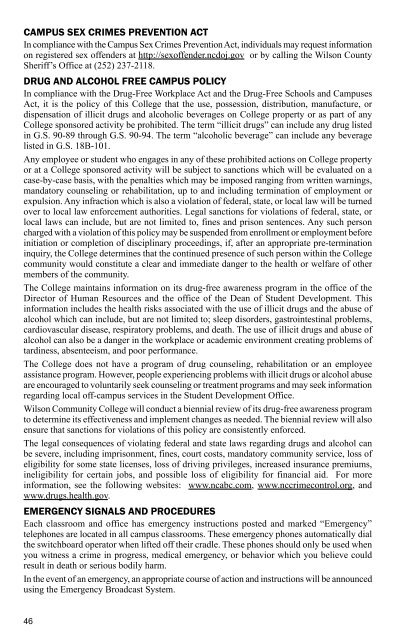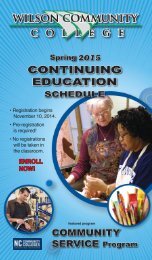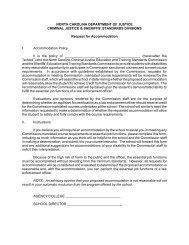Student Handbook - Wilson Community College
Student Handbook - Wilson Community College
Student Handbook - Wilson Community College
Create successful ePaper yourself
Turn your PDF publications into a flip-book with our unique Google optimized e-Paper software.
Campus Sex Crimes Prevention ActIn compliance with the Campus Sex Crimes Prevention Act, individuals may request informationon registered sex offenders at http://sexoffender.ncdoj.gov or by calling the <strong>Wilson</strong> CountySheriff’s Office at (252) 237-2118.Drug and Alcohol Free Campus PolicyIn compliance with the Drug-Free Workplace Act and the Drug-Free Schools and CampusesAct, it is the policy of this <strong>College</strong> that the use, possession, distribution, manufacture, ordispensation of illicit drugs and alcoholic beverages on <strong>College</strong> property or as part of any<strong>College</strong> sponsored activity be prohibited. The term “illicit drugs” can include any drug listedin G.S. 90-89 through G.S. 90-94. The term “alcoholic beverage” can include any beveragelisted in G.S. 18B-101.Any employee or student who engages in any of these prohibited actions on <strong>College</strong> propertyor at a <strong>College</strong> sponsored activity will be subject to sanctions which will be evaluated on acase-by-case basis, with the penalties which may be imposed ranging from written warnings,mandatory counseling or rehabilitation, up to and including termination of employment orexpulsion. Any infraction which is also a violation of federal, state, or local law will be turnedover to local law enforcement authorities. Legal sanctions for violations of federal, state, orlocal laws can include, but are not limited to, fines and prison sentences. Any such personcharged with a violation of this policy may be suspended from enrollment or employment beforeinitiation or completion of disciplinary proceedings, if, after an appropriate pre-terminationinquiry, the <strong>College</strong> determines that the continued presence of such person within the <strong>College</strong>community would constitute a clear and immediate danger to the health or welfare of othermembers of the community.The <strong>College</strong> maintains information on its drug-free awareness program in the office of theDirector of Human Resources and the office of the Dean of <strong>Student</strong> Development. Thisinformation includes the health risks associated with the use of illicit drugs and the abuse ofalcohol which can include, but are not limited to; sleep disorders, gastrointestinal problems,cardiovascular disease, respiratory problems, and death. The use of illicit drugs and abuse ofalcohol can also be a danger in the workplace or academic environment creating problems oftardiness, absenteeism, and poor performance.The <strong>College</strong> does not have a program of drug counseling, rehabilitation or an employeeassistance program. However, people experiencing problems with illicit drugs or alcohol abuseare encouraged to voluntarily seek counseling or treatment programs and may seek informationregarding local off-campus services in the <strong>Student</strong> Development Office.<strong>Wilson</strong> <strong>Community</strong> <strong>College</strong> will conduct a biennial review of its drug-free awareness programto determine its effectiveness and implement changes as needed. The biennial review will alsoensure that sanctions for violations of this policy are consistently enforced.The legal consequences of violating federal and state laws regarding drugs and alcohol canbe severe, including imprisonment, fines, court costs, mandatory community service, loss ofeligibility for some state licenses, loss of driving privileges, increased insurance premiums,ineligibility for certain jobs, and possible loss of eligibility for financial aid. For moreinformation, see the following websites: www.ncabc.com, www.nccrimecontrol.org, andwww.drugs.health.gov.Emergency Signals and ProceduresEach classroom and office has emergency instructions posted and marked “Emergency”telephones are located in all campus classrooms. These emergency phones automatically dialthe switchboard operator when lifted off their cradle. These phones should only be used whenyou witness a crime in progress, medical emergency, or behavior which you believe couldresult in death or serious bodily harm.In the event of an emergency, an appropriate course of action and instructions will be announcedusing the Emergency Broadcast System.46







